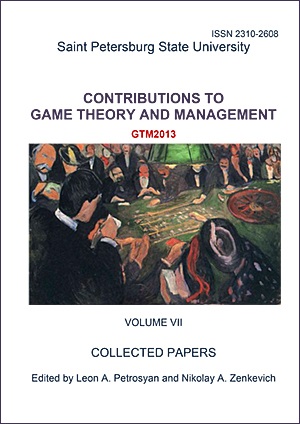Pricing in Queueing Systems M/M/m with Delays
Abstract
A non-cooperative m-person game which is related to the queueing system M/ M/ m is considered. There are n competing transport companies which serve the stream of customers with exponential distribution with parameters µ i, i=1,2,..., m respectively. The stream forms the Poisson process with intensity λ. The problem of pricing and determining the optimal intensity for each player in the competition is solved.
Keywords:
Duopoly, equilibrium prices, queueing system
Downloads
References
Downloads
Published
How to Cite
Issue
Section
License
Articles of "Contributions to Game Theory and Management" are open access distributed under the terms of the License Agreement with Saint Petersburg State University, which permits to the authors unrestricted distribution and self-archiving free of charge.




